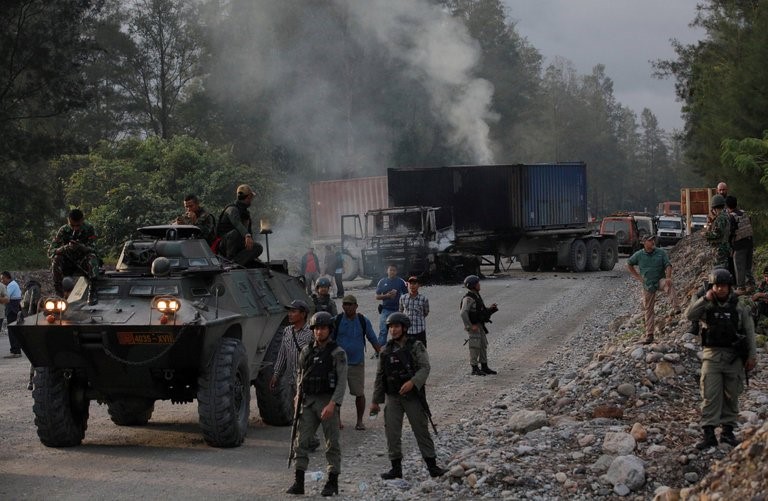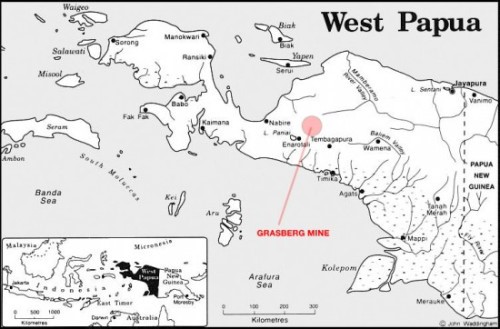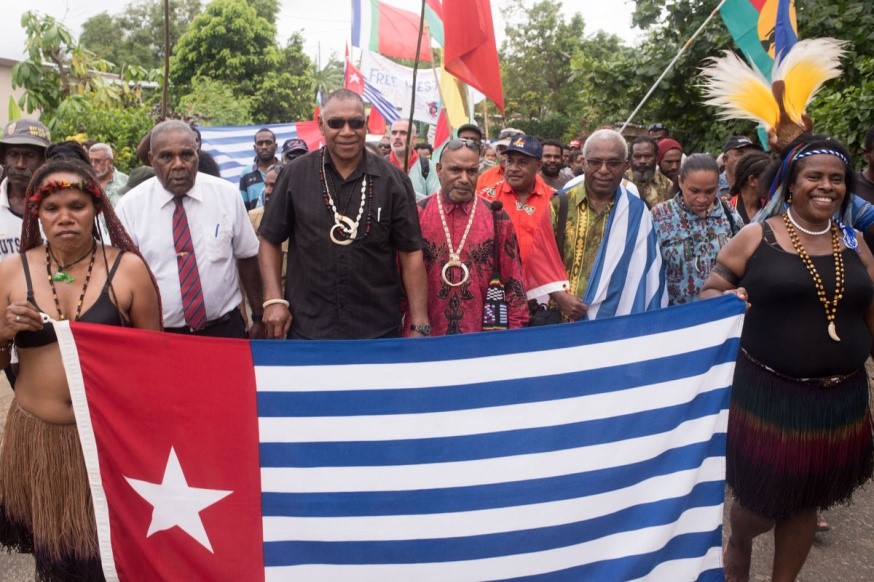The Struggle for the Liberation and Independence of West Papua Continues
Written by: on
The next largest stakeholder in the mine is the Rio-Tinto company (remember Bougainville Copper in New Guinea and the Bougainville Revolutionary Army?). After that, it is the Indonesian government.
The copper reserves alone are valued at $40Billion. Little wonder that Indonesia is intent on maintaining its colonial grip on the country.
The mine has been marred by industrial disputes, disputes between the Indonesian government and Freeport-McMoran, the guerrilla insurgency and environmental issues.
The workers carried out the strike due to their fear and uncertainty about whether they will ever get their jobs back under this policy.
The company declared the strike illegal and in its early days sacked 178 workers. The strike was to last for 30 days but due to a lack of resolution it is ongoing. As of late August, 4,200 workers had been sacked. This has caused severe hardship for these mineworkers. Lives have even been lost through suicide and loss of access to health services because the company has withdrawn health coverage. The company is guilty of violating human rights in the most callous fashion.
Furthermore the mine itself is illegal, as it was established directly as a result of the annexation of West Papua. The traditional owners of West Papuan have never given permission for the mine and they have never ceded the land where the mine is situated.
There is concern that the situation has the potential to turn into another Marikana.
In a cruel tactic, Freeport is using the mine workers as pawns in its dispute with the Indonesian government. The Indonesian government revoked Freeport’s export permit and in response the company slowed down production and introduced the “furlough” policy mentioned above.
It further stated "We and Papuans only want independence. We will continue to fight until we achieve independence”.
In November, the TPN-PB occupied five villages in the region around the mine and has been involved in skirmishes with the police and security forces. The Indonesian police and army have been putting out reports to the media that “people have been raped and some have had goods stolen” and that villagers were being held hostage. These are trumped up assertions designed to discredit the legitimate struggle of the West Papuan freedom fighters. Independent journalism is not permitted by the Indonesians inside West Papua. A few days later a community leader from one of the villages in an interview with the Sydney Morning Herald said "I would like to stress we are not being held hostage. No one in the village is being stopped from doing daily activities." He went on to say that the non-Papuans were also not being held hostage. "They are safe, they are not being treated differently. They are our neighbours." He travelled freely (ie unimpeded by the freedom fighters) out of the village and managed to give the interview.
The commander of the TPN-PB said “I don't want any lives lost, I don't want anybody from the community to fall victim”.
Irrespective of the lies from the Indonesian military about the TPN-PB, there is support for the TPN-PB here. In fact, the villagers are terrified of the 300 or so additional Indonesian army forces subsequently sent into the area. These fears were justified when villagers were intimidated, injured and killed by the Indonesian military. Since then, Indonesian forces have retaken the villages. However, this is a temporary setback for the movement to liberate West Papua. The TPN-PB is continuing its actions in the area. Indonesia cannot justify its presence there and day after day its brutality becomes more exposed to the international community.
In September this year, West Papuan leader, Rex Rumakiek (Secretary of ULMWP) presented a petition to the United Nations signed by 1,800,000 Papuans. The petition had to be smuggled from village to village in West Papua. Many of those promoting the petition were arrested, jailed, beaten and tortured.
The colossal scale of the mining activity has resulted in environmental damage in the region, including the contamination of waterways and soil with acidic leachate. Freeport is being investigated for dumping waste into rivers, the forests and the sea. The estimate of the environmental damage caused by the company is almost $14 billion (if it is at all possible to put a monetary value on such a thing!).
Needless to say, the traditional custodians of the mining area are angry about the presence of the mine, the damage done to the environment and the loss of their traditional way of life.
This is exemplified by the example of the Kamoro people who used to sustainably practice agriculture, fishing and hunting here. When the mine opened they were involuntarily displaced from their traditional land. Even the Indonesia’s National Commission on Human Rights views Freeport’s takeover of the mine area as a land grab.
A Kamoro elder recently said “The land that could be used to live on has been contaminated with chemicals. Our nature is damaged. The mountain is filled with holes. I’ve never received anything from Freeport.” He said that it would be best for Freeport to cease operations there.
The people of West Papua are continuing their protracted fight for liberation from Indonesian rule on many fronts, and victory is inevitable. Within West Papua itself support for independence is gaining support as human rights there worsen. The resolve of West Papuans to achieve this is becoming stronger. The sooner Indonesia and the multinational corporations exploiting the country realise this, the better.
Between 27 November and 3 December this year the ULMWP held its first summit in Port Vila, Vanuatu. The outcome of the summit was a strengthening of the unity amongst the various organisations that form the thrust for the liberation of West Papua.
The CPA-ML congratulates the ULMWP on the success of its summit.
The summit reported that the liberation struggle is gaining wider support internationally.
During the summit on 1 December, in a genuine gesture of Melanesian solidarity, the government of Vanuatu handed over to the West Papuan independence movement a building for their offices in Port Vila. A solidarity march was held to mark the event (see photo below). 1 December is considered by West Papuans as their national day, making this gift by the people and government of Vanuatu even more significant. Also on 1 December, in an action of global solidarity, the West Papuan flag was raised in countries around the world.
Vanuatu and the Solomon Islands are strong supporters of the just struggle for an Independent West Papua - not only at the political level but at the people to people level. The Vanuatu and Solomon Islands rugby league teams last month made an open invitation to the West Papuan team to host them in Honiara and to take part in the test matches. Should be a good series!
In September this year, a number of Pacific Island countries showed strong international leadership by defiantly raising the issue of human rights violations by Indonesia in West Papua. By contrast, it is shameful that the Australian government has been gutless, not even saying boo, let alone showing any support for an independent West Papua. So much for Australia’s election to the UN Human Rights Council!
All fair-minded Australians support a free and independent West Papua.
(1) In this article, the term West Papua refers to the entire western half of the island of New Guinea. Indonesia has tried to create confusion by dividing this occupied half into two provinces which they have named West Papua and Papua. Indonesia calls these two provinces in combination, Irian-Jaya. The indigenous population is resentful of this name.
(2) It happens that the third largest shareholder in the Freeport company is billionaire Carl Icahn, who until his resignation in August this year was a regulatory advisor to President Donald Trump. He resigned due to conflict of business interests being revealed. He is being investigated.
(3) Since its occupation of West Papua, Indonesia has instigated a policy of “Trans-migration” whereby it has systematically diluted out the indigenous population by bringing in Indonesians to settle there - a form of genocide by other means.
Print Version - new window Email article
-----
Go back
Independence from Imperialism
People's Rights & Liberties
Community and Environment
Marxism Today
International
Articles
| Board of Peace: an “upscale golf club” with select membership and hidden agendas |
| Rojava must be saved! Defend Rojava! |
| Greenland: Misusing “intelligence” to justify aggression |
| Statement on Iran |
| ICOR: US imperialism blocks Venezuela and aims for a coup d'état – international solidarity is needed |
| The US and Venezuela, 2025: moves to reassert the Monroe Doctrine |
| The struggle for mastery, and the uses and abuses of power: AI data-centres in outer space, part 2 |
| China winning the economic war with USA |
| Palestinian people's struggle not forgotten |
| Pegasus: US and Israel strengthen connections |
| Japan’s new PM drives tension in our region |
| Indian Maoists reject capitulation and surrender |
| Away with the Yankee presence in the waters of the Caribbean |
| Stop the militarisation of Space |
| The construction of a new Syria |
| US, Israel and Australia: the Indo-Pacific Strategy |
| Statement on the Massacres Committed by the Rapid Support Forces Militias in Bara and El-Fasher |
| US imperialism’s back yard blues |
| Venezuela: Resist Trump’s gangster tactics |
| DFLP to Hold Video Conference on Gaza |
-----



